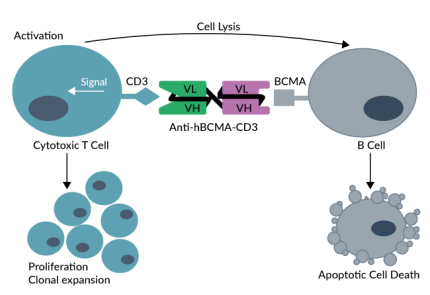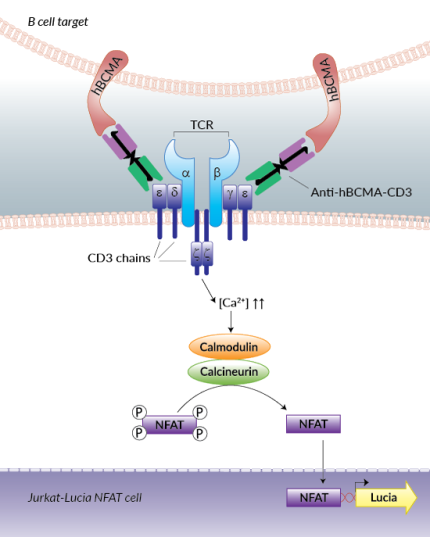Anti-hBCMA-CD3
-
Cat.code:
bimab-bcmacd3-05
- Documents
ABOUT
Monoclonal scFv antibody against human BCMA and human CD3
Anti-hBCMA-CD3 is a bispecific antibody that recognizes two human cell markers: B cell maturation antigen (hBCMA) and hCD3. This antibody features pacanalotamab’s single-chain variable fragments (scFv) joined by a glycine-serine linker and a hexahistidine tag (His6). Pacanalotamab was developed for the treatment of relapsed/refractory multiple myeloma [1].
Key features
- Reacts with human BCMA and human CD3
- ScFv of clinical relevant bispecific mAb pacanalotamab
- Hexahistidine (His6) tag
- Provided azide-free
- Each lot is functionally tested
Applications
- Adjustment studies of B cell contact-dependent killing
- Improving T cell activation
InvivoGen also offers an Anti-hCD19-CD3 bispecific antibody as well as other clinically relevant antibodies and their corresponding isotype controls.
References:
1. Topp et al., 2020. Anti-B-Cell Maturation Antigen BiTE Molecule AMG 420 Induces Responses in Multiple Myeloma. J Clin Oncol. 2020 Mar 10;38(8):775-783.
All products are for research use only, and not for human or veterinary use.
SPECIFICATIONS
Specifications
BCMA, CD3
Human
Sodium phosphate buffer, saccharose
Negative (tested using EndotoxDetect™ assay)
Cellular assays, ELISA, flow cytometry
Each lot is validated by flow cytometry.
CONTENTS
Contents
-
Product:Anti-hBCMA-CD3
-
Cat code:bimab-bcmacd3-05
-
Quantity:50 µg
Shipping & Storage
- Shipping method: Room temperature
- -20 °C
- Avoid repeated freeze-thaw cycles
Storage:
Caution:
Details
BCMA
Human B cell maturation antigen (BCMA, also known as CD269 or TNFRSF17) is a type III transmembrane glycoprotein playing a central role in B cell maturation and differentiation towards plasma cells [1]. It is expressed on plasma cells, mature B cells as well as multiple myeloma (MM) cells. Interestingly, hBCMA is expressed at similar levels throughout the different stages of MM, which makes it a frequently used target for T cell redirection therapy.
The BiTE® Molecule AMG 420 , also known as pacanalotamab targeting hCD3 and hBCMA, engages unstimulated T cells to proliferate and subsequently trigger T cell-mediated lysis of hBCMA-positive cells. Thus, antigen presentation is not required, co-stimulation events are bypassed, and T cells remain persistently activated [2].
By interacting with its ligands BAFF (B cell-activating factor) and APRIL (a proliferation-inducing ligand), hBCMA activates several pathways such as NF-κB, AKT, PI3K (phosphoinositide 3-kinase), STAT3, and MAPKT [1, 3]. These various interactions result in enhanced B cell survival and proliferation through the upregulation of anti-apoptotic proteins. Also, it can promote tumor cell growth, survival, and drug resistance [1].
CD3
The cluster of differentiation 3 (CD3, formerly named T3) is a multimeric protein complex consisting of four polypeptides (CD3ε, CD3γ, CD3δ, and CD3ζ) that assemble as three dimers (εγ, εδ, and ζζ) [4]. It is a marker of T cells, which recognizes and participates in the elimination of infected cells and tumor cells through the interaction between the TCR (T cell receptor) on T cells and the MHC-peptide complex on antigen-presenting cells [4-5]. Because of its short cytoplasmic tail, the TCR lacks the ability to signal and requires non-covalent association with the CD3. Upon antigen recognition, the TCR/CD3 complex on T cells triggers downstream intracellular signaling and participates in T cell activation [4].
1. Abramson et al., 2020. B-Cell Maturation Antigen (BCMA) as a Target for New Drug Development in Relapsed and/or Refractory Multiple Myeloma. Int J Mol Sci. 2020;21(15):5192.
2. Topp et al., 2020. Anti-B-Cell Maturation Antigen BiTE Molecule AMG 420 Induces Responses in Multiple Myeloma. J Clin Oncol. 2020 Mar 10;38(8):775-783.
3. Hosny et al., 2021. Current State of the Art and Prospects of T Cell-Redirecting Bispecific Antibodies in Multiple Myeloma. J Clin Med. Oct 6;10(19):4593.
4. Chetty R. & Gatter K., 1994. CD3: structure, function, and role of immunostaining in clinical practice. J. Pathol. 173(4):303-307.
5. Smith-Garvin J.E. et al., 2009. T Cell Activation. Ann. Rev. Immunol. 27:591-619.3.
DOCUMENTS
Documents
Technical Data Sheet
Validation Data Sheet
Safety Data Sheet
Certificate of analysis
Need a CoA ?






